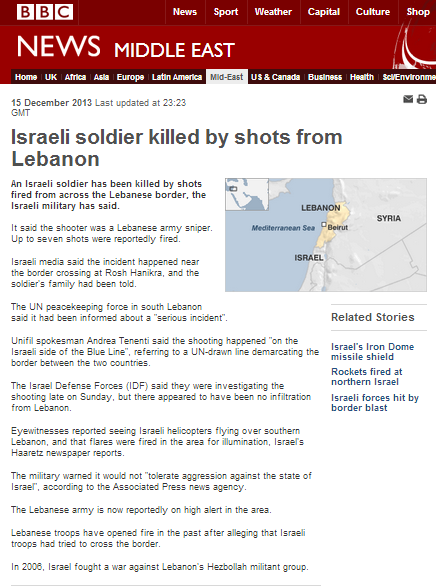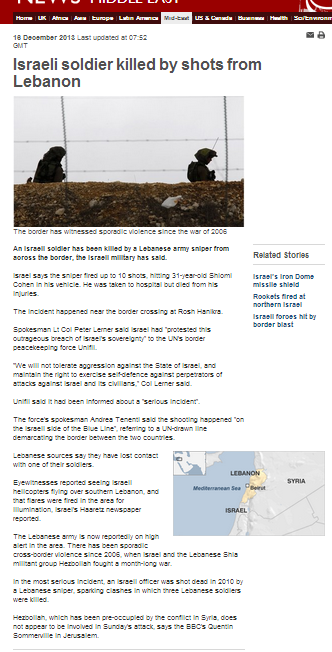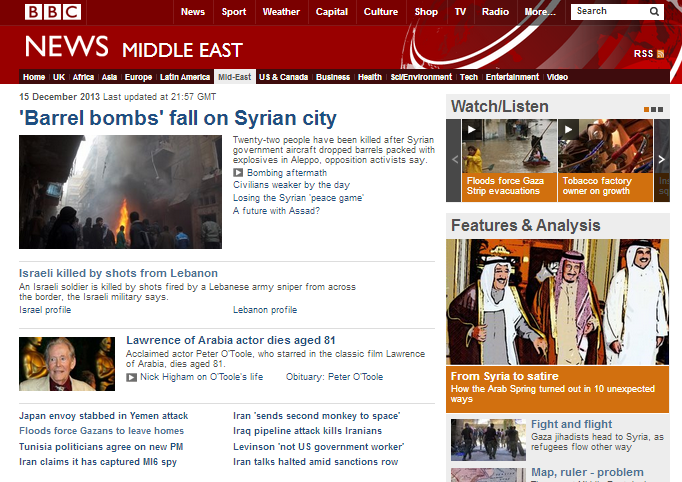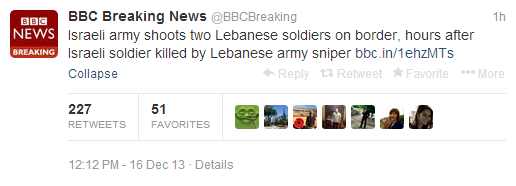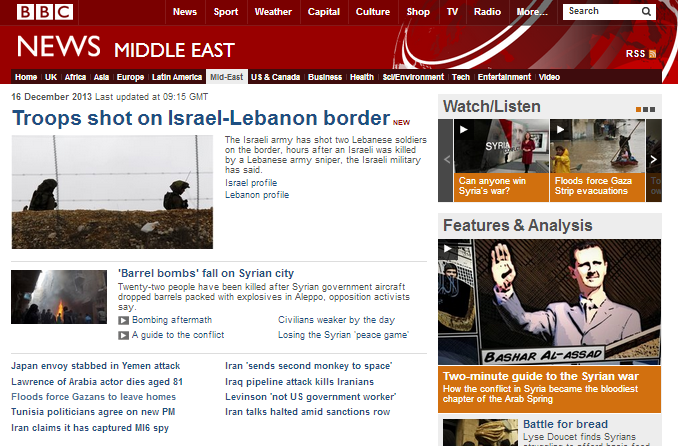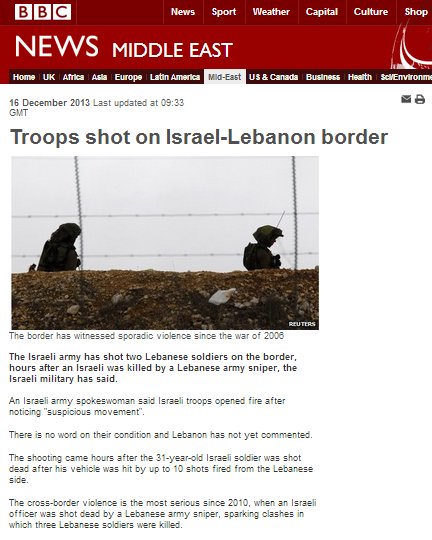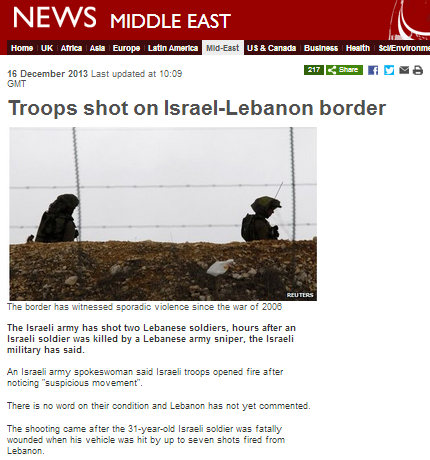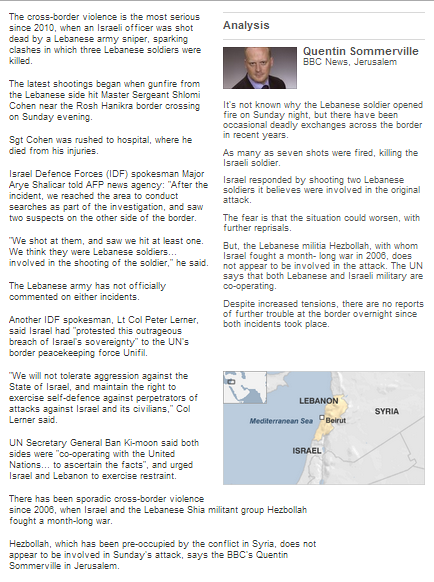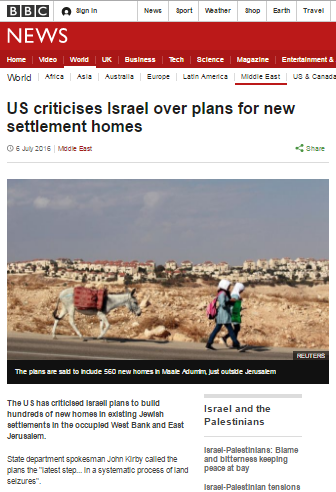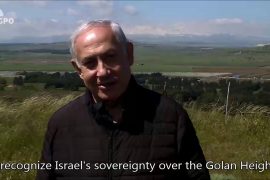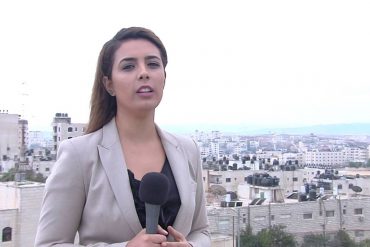At around 8:30 pm on Sunday, December 15th, IDF navy officer Shlomi Cohen aged 31 from Afula was driving in his vehicle near Rosh Hanikra, some 50 meters south of the border between Israel and Lebanon, when he was hit by cross-border sniper fire. Master Sgt. Cohen was evacuated to Nahariya hospital, but died of his wounds. He is survived by his wife and baby daughter.
The report on the incident which appeared on the Middle East page of the BBC News website – with the later version titled “Israeli soldier killed by shots from Lebanon” – has undergone many changes since its initial publication. Below are screenshots (click to enlarge) of the report as it appeared late on Sunday night and after amendment on early Monday morning.
The report’s later version is reasonably accurate and impartial with regard to the incident itself. The article states that “Lebanese sources say they have lost contact with one of their soldiers” although Lebanese media sources reported that the sniper returned to his base on Monday morning.
Less accurate is the additional general background information provided in the report. Versions 2, 3 and 4 of the article closed with the statement “In 2006, Israel fought a war against Lebanon’s Hezbollah militant group” but failed to inform readers that the war began as a result of another cross-border incident in which Hizballah attacked an IDF patrol in Israeli territory, killing three soldiers and kidnapping two others whilst concurrently firing missiles at Israeli civilian communities.
That information is also omitted from the article’s fifth and final version which states:
“There has been sporadic cross-border violence since 2006, when Israel and the Lebanese Shia militant group Hezbollah fought a month-long war.
In the most serious incident, an Israeli officer was shot dead in 2010 by a Lebanese sniper, sparking clashes in which three Lebanese soldiers were killed.”
Contrary to the impression created by the BBC, cross-border violence also occurred before 2006, with the most well-known example being the kidnapping and killing of Adi Avitan, Benny Avraham and Omar Sueid in October 2000.
The BBC’s reference to the 2010 incident in which Lt. Col. (res) Dov Harari was killed and Cpt. Ezra Lakia was injured as having been carried out “by a Lebanese sniper” does not sufficiently clarify the fact that – as in this latest incident – the sniper was a member of the Lebanese Armed Forces and no attempt is made to inform audiences of the intricate background to such sniping incidents.
However, the BBC’s approach to this story took a curious turn on the morning of Monday December 16th. The above mentioned report on the killing of Shlomi Cohen had appeared on the BBC News website’s Middle East page on Sunday evening as the event unfolded.
On Monday morning local time, the Tweet below was sent from the BBC Breaking News account.
The report on the incident in which Shlomi Cohen was killed disappeared from the BBC News website’s Middle East page.
That report was replaced by another – later titled “Troops shot on Israel-Lebanon border” – the original version of which (headlined “Israel army shoots Lebanese soldiers”) merely stated:
“Israeli army shoots two Lebanese soldiers on border, hours after Israeli soldier killed by Lebanese army sniper.
More details to follow.”
The report’s second version looked like this:
The article’s third version appears below.
In other words, an editorial decision was taken to replace a serviceable report on an incident which was sparked by the deliberate shooting and killing of an Israeli soldier on Israeli territory with a headline which initially informed audiences only that “Israeli army shoots Lebanese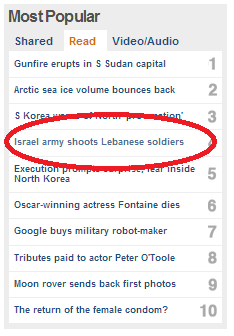 soldiers” (see the BBC website’s “Most Popular” side-box as it appeared early on Monday afternoon).
soldiers” (see the BBC website’s “Most Popular” side-box as it appeared early on Monday afternoon).
That report was expanded into yet another example of “last-first” reporting which, despite it being stated in the body of the article that the Lebanese authorities had not confirmed the incident, opens:
“The Israeli army has shot two Lebanese soldiers, hours after an Israeli soldier was killed by a Lebanese army sniper, the Israeli military has said.”
The overall effect of those editorial decisions is of course to promote the notion of equivalence between the reported shooting of two Lebanese soldiers during a military response to a serious cross-border incident and the completely unprovoked killing of an Israeli soldier on Israeli territory.

